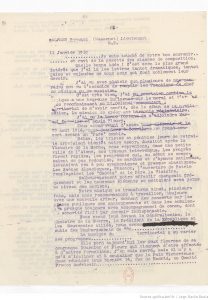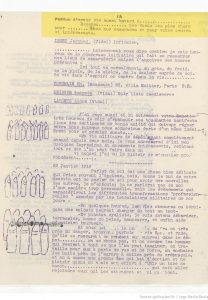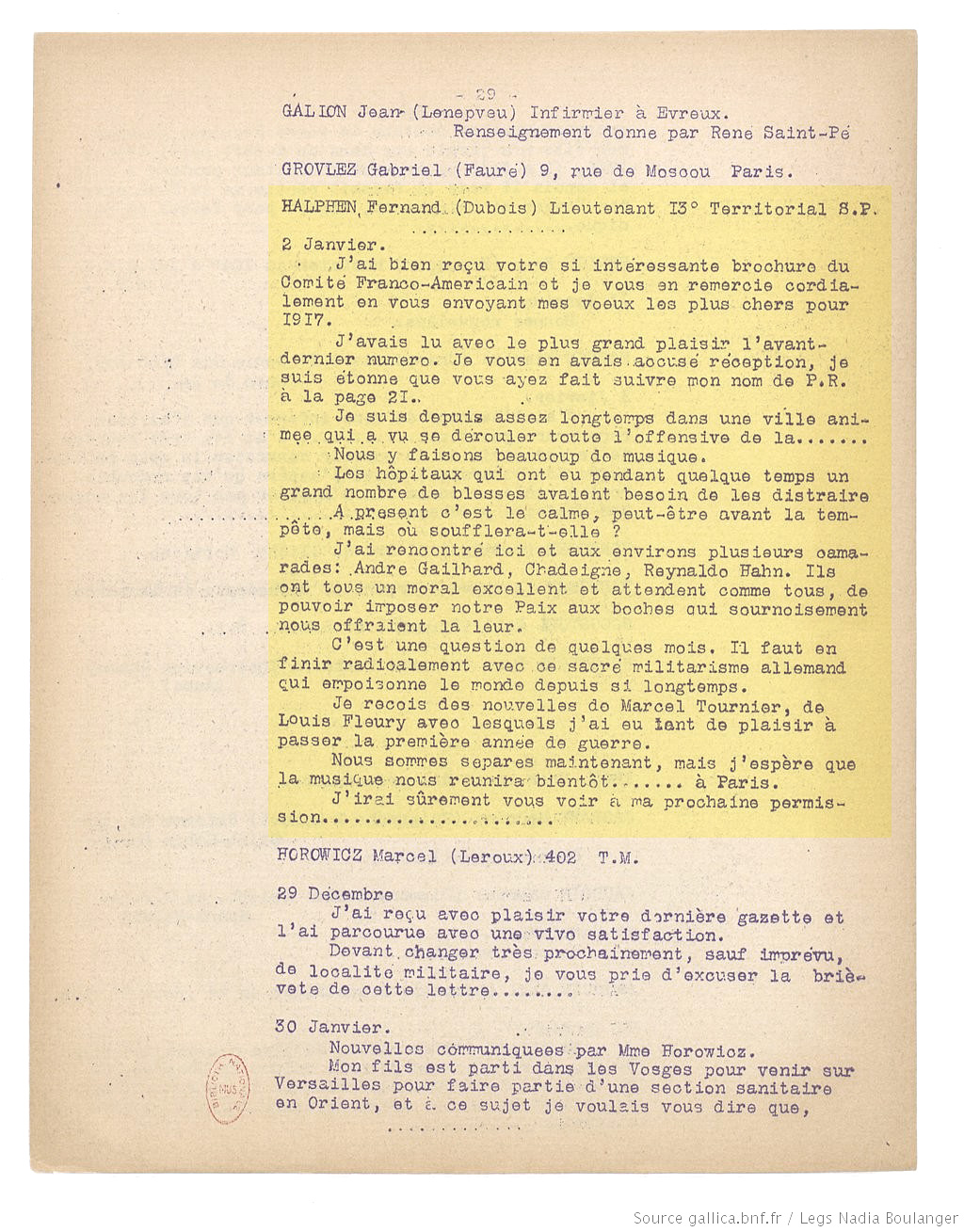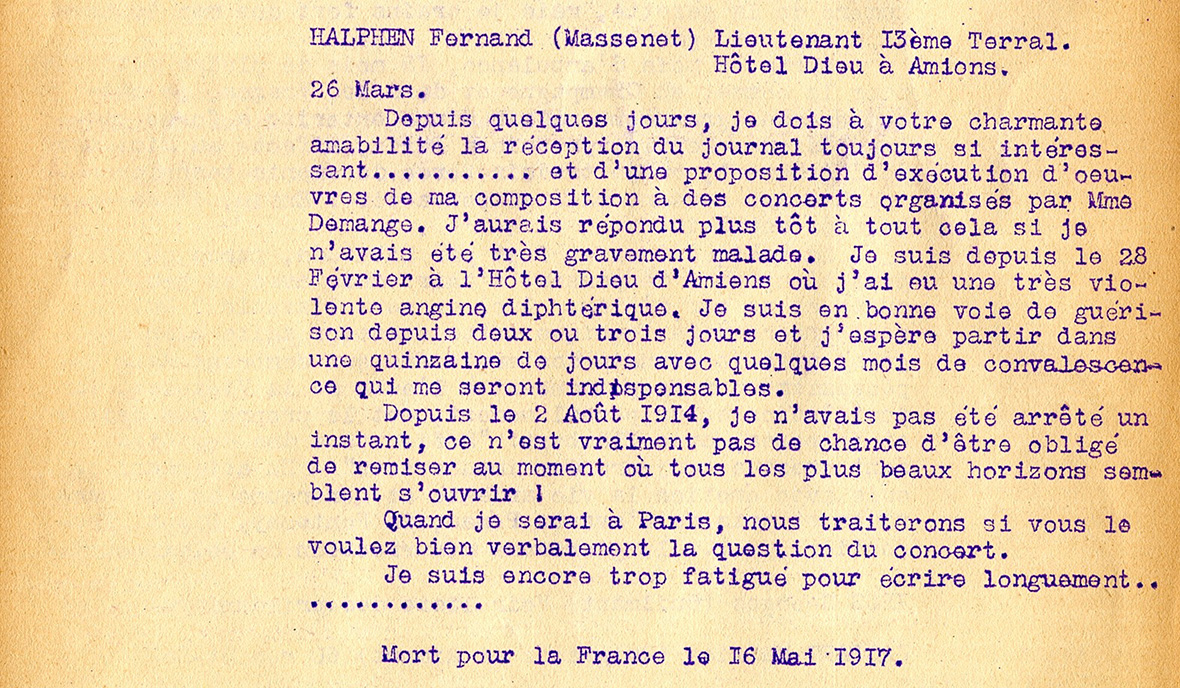Paris-Manchester 1918
Conservatoires in time of war
Letters from Fernand Halphen to the Gazette des classes du Conservatoire
Fernand Halphen was a regular contributor to the Gazette des classes du Conservatoire from its first issue. The six letters that he sent to the Franco-American Committee (one undated letter of 1915; 11 January, 30 August, and 3 December 1916; 2 January and 26 March, 1917) are an important source of information on Halphen’s situation during the war and the way in which he maintained his network of relationships through the Conservatoire in spite of difficulties occasioned by the conflict.
1st letter (11 January 1916)
Facsimile
Translation
Note : les lacunes (indiquées en italique entre crochets) ont été complétées grâce à la lettre autographe conservée à la Bibliothèque nationale de France, département de la musique, Rés Vm Dos 88 (6), folio 77.
HALPHEN Fernand (Massenet[1]) Lieutenant
S.P.[2]
11 January 1916
[Dear Classmates,
I am overwhelmed.] I am touched by your good wishes [, charmed by this succulent leg] and delighted with the Gazette des classes de composition.
What a good idea! It was with the greatest of interest that I read the letters – ranging from dramatic to happy and cheerful – from all those who are nobly doing their duty.
I was pleased to read that many of our classmates have had the opportunity to serve as bandmasters or musicians.
This is excellent. I have noticed the beneficial effect that music has on morale, and I was very grateful to the Lt[3] Colonel commanding [the 13th] Territorials for entrusting me, at the start of the mobilisation, with the task of forming a regimental band.
I’ve been fortunate in having Marcel Tournier[4] and Louis Fleury[5] to assist me.
We got some fairly good players together, and on 23 August 1914 we played a concert in front of a crowded “park”.
Unfortunately, the sad and painful days of the retreat put a stop to our activities. Immediately after the victory at the Marne,[6] in a small town in Aisne, we restarted the work that had been interrupted. We made quick progress, and the programmes that had initially consisted of double-quick steps, marches and national anthems, gradually took on a symphonic, almost classical character. The Scènes Alsaciennes,[7] Phaeton,[8] and the overture to Patrie[9] replaced “Cadets” and Père la Victoire.[10]
Unfortunately, there were regular changes of personnel, and the new players had difficulty reaching the level of the previous ones.
And so our band changed completely several times, but each time we began our work anew, always with fresh enthusiasm, playing concerts on the public squares where we were stationed and in the army hospitals, almost always accompanied by cannon fire, the sound of which became an integral part of our programme.
We played for the Commander-in-Chief, the Minister of War, the President of the Republic and the Allied sovereigns. We [buried generals] and were bombarded by 380s . . . . . . . . . . . . . . . . . . . . . . . .
The band of the [13th] Territorials managed to put some variety into its programmes . . . . . . . . . . . . . . .
Today our band is losing the two jewels in its crown, Tournier and Fleury, who have just been transferred to other units. I am rather upset, but I just have to accept it and hope that a victorious peace will soon see us reunited at 14 Rue de Madrid[11], at the Franco-American Committee [at the National Conservatoire of Music.]
Do excuse me for being so chatty! . . .
[My dear classmates], I would like to wish all the very best [to yourselves and] all our fellow students, and I hope that your very interesting project will be successful.
[1]Jules Massenet (1842-1912), teacher of composition at the Conservatoire from 1878 to 1896.
[2]Secteur postal [postal sector]. The complete letterhead on this autograph letter is as follows:
“Lieutenant Halphen, Commander of the External Company of the 13th Territorial Infantry Regiment”.
[3]Lieutenant.
[4]Marcel Tournier (1879-1957), second prize-winner of the Grand prix de Rome in 1909, had been a harp teacher at the Conservatoire since 1912. During the war, he was assistant bandmaster to Fernand Halphen before being transferred to the 68th infantry regiment. He also contributed a great deal to the Gazette des classes du Conservatoire.
[5]Louis Fleury (1878-1926) was a flautist, famous for premièring Syrinx by Claude Debussy (1860-1918) in 1913.
[6]9 September 1914.
[7]Orchestral suite by Jules Massenet (1882).
[8]Most probably the symphonic poem by Camille Saint-Saëns (1873).
[9]Overture, opus 19 by Georges Bizet (1873).
[10]“Father Victory”: a popular song composed in 1888. The words were by Lucien Delormel (1847-1899) and Léon Garnier (1856-1905), the music by Louis Ganne (1862-1923).
[11]This was the address of the Conservatoire. Today this building houses the Paris Regional Conservatoire.
Source
Fernand Halphen (11 January 1916) Letter to the Franco-American Committee, in: Gazette des classes de composition du Conservatoire, No. 2, Paris, February 1916, Bibliothèque nationale de France, Music Department, Rés Vm Dos 88 (1), p. 12-13. View on Gallica.
Document description: roneoed document in violet ink, 21×27 cm.
Catalogue : http://catalogue.bnf.fr/ark:/12148/cb43639008g
2nd letter (2 January 1917)
Translation
HALPHEN Fernand (Dubois[1]), lieutenant, 13th Territorials S.P.[2]
2 January.[3]
I have received your very interesting brochure about the Franco-American Committee, and I would like to thank you very much for sending this. I wish you all the best for 1917.
I read the issue before last with the greatest of pleasure[4]. I did confirm receipt of this issue, so I am very surprised that you listed me on page 21 with those who had not replied to the previous Gazette.
For some time now I have been in this bustling town that saw the whole course of the . . . . . . . . . . . . offensive.
We play a lot of music here.
For a while the hospitals had a great many wounded, and some entertainment was needed for them.
Things are quiet at the moment. Perhaps this is the calm before the storm – but where will it blow?
I have met many classmates around here: André Gailhard[5], Chadeigne[6] and Reynaldo Hahn[7]. They are all in excellent spirits and are waiting, as we all are, to dictate peace on our terms to the Huns, who deceitfully offered us peace on theirs.
That is only a matter of months. We must eradicate this damned German militarism that has been plaguing the world for so long.
I hear news from Marcel Tournier[8] and Louis Fleury,[9] with whom I spent such pleasant times during the first year of the war.
We are now separated from each other, but I hope that music will bring us together again soon . . . . . . . . . in Paris.
I shall certainly come and see you when next I am on leave . . . . . . . . . . . . . . . . . . . . . . . .
[1]Théodore Dubois (1837-1924), former teacher of composition and director of the Conservatoire from 1896 to 1905.
[2]Secteur postal [postal sector]
[3]1917.
[4]Gazette No. 3.
[5]André Gailhard (1885-1966), composer, son of Pierre Gailhard, director of the Paris Opera.
[6]Marcel Chadeigne (1876-1926), 1st prize for piano in 1895.
[7]Reynaldo Hahn (1874-1947), formerly Halphen’s fellow student at the Conservatoire.
[8]See the letter of 11 January 1916.
[9]See the letter of 11 January 1916.
Source
Fernand Halphen (2 January 1917) Letter to the Franco-American Committee, in: Gazette des classes du Conservatoire, No. 6, Paris, March 1917, Bibliothèque nationale de France, Music Department, Rés Vm Dos 88 (1), p. 29. Voir sur Gallica.
Document description: roneoed document in violet ink, 21×27 cm.
Catalogue : http://catalogue.bnf.fr/ark:/12148/cb43639008g
3rd letter (26 mars 1917)
Translation
HALPHEN Fernand (Massenet[1]), lieutenant, 13th Terral[2]. Hôtel-Dieu Hospital, Amiens.
26 March[3].
A few days ago I received the Gazette that you kindly sent, and it is as interesting as ever . . . . . . . . . . . together with a proposal for performance of works by the composition classes at concerts organised by Mrs Demange. I would have replied sooner if I had not been seriously ill with very severe tonsillitis at the Hôtel-Dieu Hospital in Amiens since February 28th. I have been getting better for two or three days, and I hope to be out in a fortnight, after which I’ll need to have several months off for convalescence.
I had been constantly active since 2 August 1914; it’s most unfortunate that I am now forced to stop just as things seem to be looking up!
When I am in Paris, if you wish, let us talk about this idea of a concert.
I am still too tired to write for long . . . . . . . . . . .
Killed in action on 16 May 1917.
[1]Jules Massenet (1842-1912), teacher of composition at the Conservatoire from 1878 to 1896.
[2]Territorials.
[3]1917.
Source
Fernand Halphen (26 March 1917) Letter to the Franco-American Committee, in: Gazette des classes du Conservatoire, No. 8, Paris, April 1917, Hector Berlioz Multimedia Library, Rmb 472 (8), p. 23.
Document description: roneoed document in violet ink, 21×27 cm.
Bibliography
Schnapper Laure, 2014: “Fernand Halphen (1872-1917), un musicien au service de la France”, in Doé de Maindreville Florence, Etcharry Stéphan (eds.), La Grande Guerre en musique. Vie et création musicales en France pendant la Première Guerre mondiale, Bruxelles: éd. Peter Lang, p. 121-138.
Schnapper Laure (ed.) (2017) Du salon au front. Fernand Halphen (1872-1917), Paris: Hermann.







